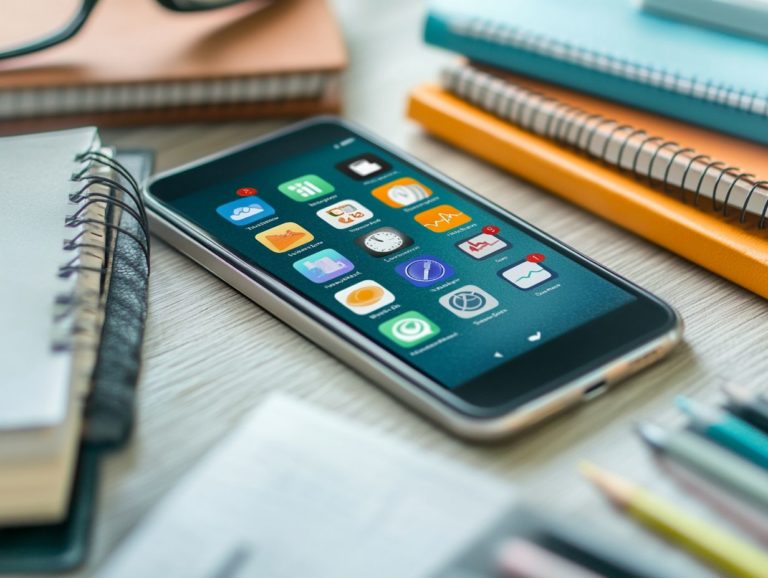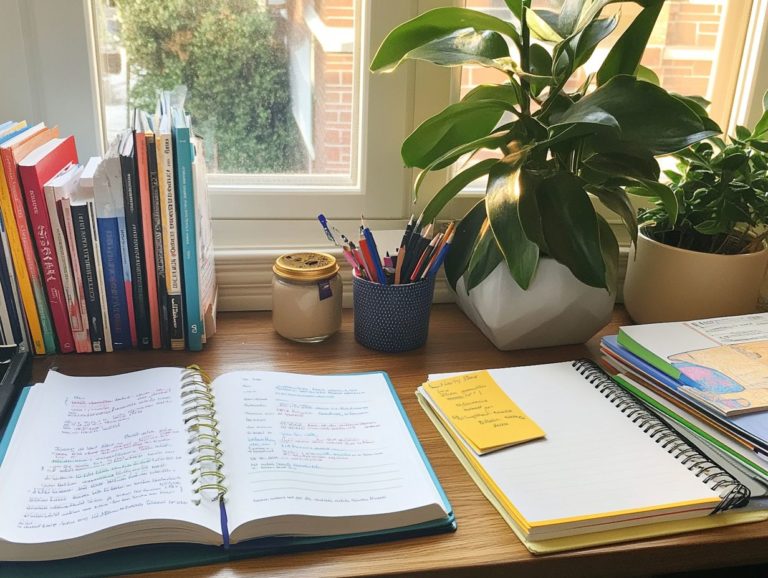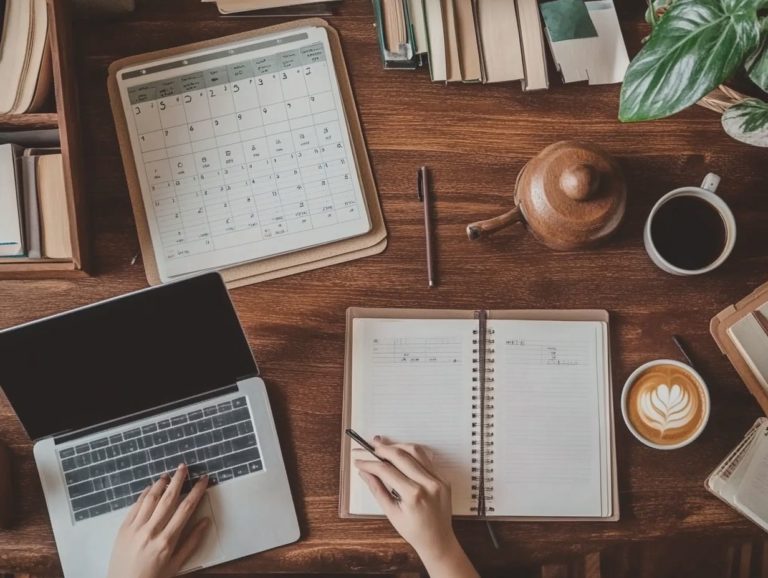how to change your study methods if not working?
Struggling with study methods can be frustrating, especially if you aren t seeing the results you want. This article is your personal guide to assess your current approach and pinpoint areas for improvement.
Explore various learning styles to find a method that truly resonates with you. You ll discover practical tips for creating a study plan and overcoming hurdles like procrastination.
Get ready to transform your study habits into something that genuinely works for you!
Contents
- Key Takeaways:
- Assessing Your Current Study Methods
- Understanding Different Learning Styles
- Tips for Changing Your Study Methods
- Overcoming Common Challenges
- Evaluating the Effectiveness of Your New Study Methods
- Frequently Asked Questions
- What should I do if my current study methods are not working for me?
- How can I identify which study methods are not effective?
- What are some common signs that my study methods are not working?
- What alternative study methods can I try?
- How often should I review and reassess my study methods?
- What should I do if I m still struggling to find effective study methods?
Key Takeaways:

Identify areas for improvement in your current study methods. Find the right method for your learning style to maximize your potential.
Create a study plan and use various techniques to effectively change your methods.
Assessing Your Current Study Methods
Evaluating your current study methods boosts your academic performance. Ensure your techniques fit your unique learning style.
Looking closely at your habits can reveal improvement opportunities, whether in time management or organizing materials.
Gain insights into how effective your approach is. This will help you create a more efficient study routine that aligns with your goals.
Identifying Areas for Improvement
Focus on areas that can enhance your learning experience. Recognizing distractions like mobile devices and noisy environments creates a more focused atmosphere.
Effective time management strategies, such as the Pomodoro technique, help you study productively. Incorporating self-testing turns passive reading into active learning.
Create a quiet, organized space free from distractions. Establish a routine that prioritizes concentration for better academic results.
Understanding Different Learning Styles
Knowing different learning styles is vital if you want to optimize your study sessions. Identifying if you are an auditory, visual, or kinesthetic learner helps you implement strategies that work for you.
For instance, use concept maps as a visual learner or try peer teaching if you learn better through listening. This awareness helps you take charge of your learning journey.
Finding the Right Study Method for You
Finding the right study method can significantly enhance your study sessions. Consider the Feynman Technique, which simplifies concepts by explaining them to someone else.
If you are a visual learner, add diagrams to illustrate your ideas. The Leitner System, which uses spaced repetition, is perfect for structured learners.
By customizing these methods to fit your preferences, you can boost your understanding and retention. This paves the way for greater academic success.
Tips for Changing Your Study Methods
Changing your study methods enhances academic performance and enriches your learning. Consider how to switch between study techniques to assess your methods and identify ineffective habits.
Implement fresh strategies that encourage active engagement. This often requires a commitment to effective time management and minimizing distractions.
Creating a Study Plan

Creating a structured study plan is crucial for managing your time effectively and ensuring you cover all necessary materials during your study sessions. By setting specific goals, you can focus on mastering particular subjects or concepts.
It s equally important to schedule dedicated study sessions. Establishing a routine transforms learning into a more habitual and less stressful endeavor. Organizing materials like textbooks, notes, and digital resources streamlines your study experience.
Utilizing tools like calendars or task managers enhances your time management skills. You can prioritize tasks and allocate your time wisely, leading to better retention of information and a more organized study strategy.
Utilizing Different Study Techniques
Employing a variety of study techniques can significantly enhance your studying efficiency and information retention, allowing you to engage actively with the material.
Incorporating methods like spaced practice strategically timing your study sessions boosts long-term retention and helps you avoid the cramming stress that often accompanies exams.
Engaging in retrieval practice, or testing yourself on the material, fosters a deeper understanding and improves recall. Crafting concept maps helps you visually organize information, solidifying connections between concepts, while flashcards are excellent tools for quick reviews.
These active studying strategies transcend passive reading and enable you to take control of your education, dramatically elevating your academic performance.
Overcoming Common Challenges
Overcoming common challenges like procrastination and distractions is essential for maintaining effective study habits and reaching your academic goals. These hurdles can undermine your study techniques and adversely affect your learning outcomes.
Implement targeted strategies such as structured time management and focused study sessions to regain control over your study environment and significantly enhance your concentration.
Dealing with Procrastination and Distractions
Confronting procrastination and distractions is crucial for maintaining your focus and improving the effectiveness of your study sessions. Create a dedicated workspace to cultivate an environment that minimizes interruptions and fosters concentration.
Designate a specific area for your studies, free from the usual chaos of home, where everything promotes productivity.
Using techniques like the Pomodoro Technique breaking your study time into manageable intervals with short breaks can be a game changer. This method helps maintain mental sharpness without feeling overwhelmed.
Incorporating tools like timers or apps that block distracting websites can significantly improve your time management skills and simplify the path to achieving your academic goals.
Managing Time and Priorities
Effectively managing your time and priorities is crucial for balancing academic responsibilities with personal commitments.
Creating a structured study plan acts as your roadmap, allowing you to identify the most pressing tasks and allocate specific time blocks for each. By breaking larger assignments into manageable segments and setting deadlines, you can reduce stress from heavy workloads.
Incorporating techniques like the Pomodoro Technique elevates your focus during study sessions, making it easier to absorb information while also preventing burnout. Prioritizing tasks based on deadlines and importance ensures you meet your academic obligations while carving out time for yourself, fostering a holistic approach to time management.
Evaluating the Effectiveness of Your New Study Methods
Evaluating the effectiveness of your new study methods is a crucial step in aligning your strategies with your academic goals and enhancing your performance.
Regular assessments engage you in thinking about your own thinking, allowing reflection on which techniques yield positive results and which require adjustments.
By incorporating self-testing and diligently tracking your progress, you can identify the most effective approaches to elevate your learning experience and ultimately achieve greater academic success.
Tracking Progress and Making Adjustments

Tracking your progress and adjusting your study methods are crucial. These steps help improve your academic performance and learning efficiency.
By regularly reviewing your achievements, you can gain valuable insights into your strengths. You can also identify areas that may need enhancement.
Testing yourself provides an effective way to assess your retention. It offers a clear picture of your understanding.
Developing skills to think about your own learning allows you to reflect on your processes. This helps you make informed decisions about which strategies align best with your unique style.
This reflective approach boosts your confidence and fosters a growth mindset, essential for achieving your long-term educational goals.
Frequently Asked Questions
What should I do if my current study methods are not working for me?
If your study methods aren’t working for you, it’s time for a change!
How can I identify which study methods are not effective?
Start by evaluating your current routine and identifying areas where you struggle or don t see improvement. This can help pinpoint ineffective study methods.
What are some common signs that my study methods are not working?
Common signs include consistently poor grades, feeling overwhelmed or stressed while studying, and difficulty retaining information.
What alternative study methods can I try?
There are various methods to try, such as creating flashcards, using mnemonic devices, practicing active reading, or studying in a group. Experiment to see what works best for you.
How often should I review and reassess my study methods?
Regularly review and reassess your methods, especially if you’re not seeing desired results. This helps you make necessary adjustments.
What should I do if I m still struggling to find effective study methods?
If you’re having difficulty, consider seeking help from a tutor, teacher, or academic advisor. They can provide personalized recommendations and strategies to improve your study habits.







